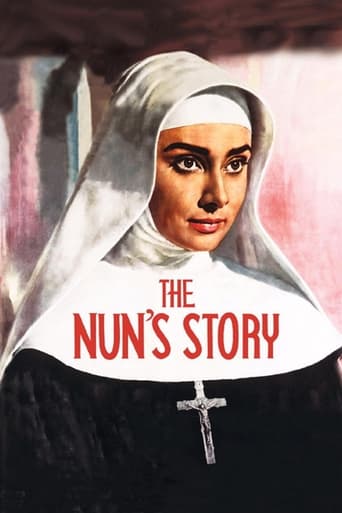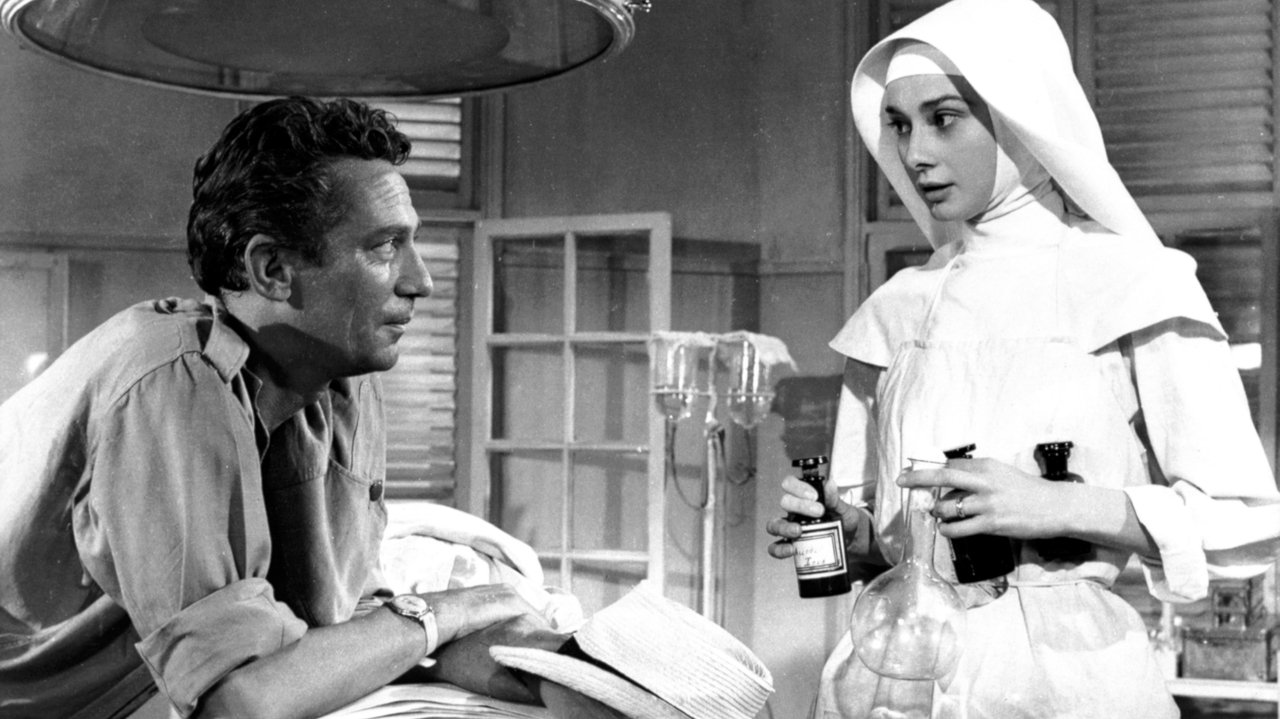frankwiener
Regardless of whether the viewer is of the Catholic faith or a believer in any religion at all, this is a film about the serious dedication of one's life to any set of profound principles and about the enormous challenges that we can face when we attempt to commit ourselves to what we at first believe are our most important convictions. Seeing this film only in the context of "organized religion", as so many reviewers here have done, truly stifles its universal message. Have you ever attempted to dedicate yourself to any effort or to a way of life that required huge self sacrifice and then discovered that you could not completely fulfill the task? Then, upon this disturbing revelation, you looked closely at those who managed to succeed at accomplishing what you could not do, realizing that they thrived only because they did not believe that they were sacrificing or foregoing anything of importance in pursuing their goals while you obviously did.To me, this distinction was at the core of the struggle that Sister Luke/Gabrielle (Audrey Hepburn) was forced to endure--that is, there mere fact that it was a struggle in the first place. Two very wise physicians, including her father, Dr. Van der Mal (Dean Jagger), and Dr. Fortunati (Peter Finch), recognized that she would not be able to devote herself to her strict order, as required, before she finally recognized this on her own. Her father knew that she would fail at the total obedience that was required of her, and Dr. Fortunati perceptively acknowledged at one point that she just didn't have "it" in her. Her intense hatred of the Nazis allowed her to see the truth about herself.As with any successful film, its artistic triumph is the result of a combination of factors, including the direction of a true master, Fred Zinnemann, and the photography of Franz Planer both in angular, austere Belgium and in the far less restricted jungles of the former Belgian Congo. Zinnemann paced the action well by balancing the highly cerebral, spiritual content against some very dramatic physical scenes, including one involving madness and another resulting in an extremely violent and disturbing murder. Then add the intelligent script of a very serious writer, Robert Anderson (The Sand Pebbles, Tea and Sympathy), an outstanding cast, primarily Hepburn, Finch, and Jagger, who were all terrific, and the powerful musical score of Alfred Newman. Shake it all up and the result is a superb product that I will want to see again and again.Of all of the worthy components here, the one that truly stands out is the performance of Audrey Hepburn. I can understand why this was her favorite among the many, diverse films in which she appeared. Me too!
beresfordjd
This movie is Audrey Hepburn's best and really shows what a fine actress she was.She was versatile able to do comedy and drama with equal aplomb.Take a look at Two for the Road a FredericRaphael-written dissection of a marriage which is both comic and tragic by turns. It seems a travesty to me that she was only nominated for The Nun's Story when she quite plainly should have been awarded one as best actress. Peter Finch,too is excellent as the dedicated doctor working in the Congo and the sexual chemistry between them is palpable. I have seen The Nun's Story lots of times over the years and it never fails to impress me. Due to the times in which it was made it is naturally dated now but the subject matter and performances supersede all complaints on that score. It warrants several viewings and rewards every time.
Robert J. Maxwell
Belgium, 1930. Audrey Hepburn, daughter of a famous surgeon (Jagger), joins a convent, undergoes a rigorous training in humiliation, becomes a star pupil at the school for tropical medicine, is sent to what was then called the Belgian Congo where she becomes an indispensable surgical assistant, has an emotional but strictly Platonic brush with the demanding and non-believing doctor (Finch), is sent back to Belgium against her wishes, and resigns from the order.Several scenes seemed especially instructive. First, the whole business of going through boot camp at the nunnery was an excellent example of initiation rituals as they're found around the world. I won't go into details but being given a new name is a common feature of these rites of passage. Gabrielle van der Mal becomes Sister Luke. In our society we have confirmation names, Hebrew names, and nicknames given during service in the Marine Corps.Second, Hepburn is doing first rate work at the school for tropical medicine. She's intelligent, a nurse, and the daughter of a surgeon. But she's breaking some of the rules as well. She doesn't show enough HUMILIATION, so her superior asks her to fail the final exam as evidence that she's rid herself of the sin of false pride. Let's put it this way -- she's supposed to deprive the community of a skilled nurse with a specialty in tropical medicine to prove her subordination to the church.As capitalism developed, is it any wonder that Reformed Churches arose? The sociologist Max Weber made a convincing argument that it was the overthrow of Catholicism, with its vows of poverty and its denunciation of usury, that made capitalism possible. Not that one cause the other, but that they were concordant in their values. If Catholicism taught that being poor was a virtue, Protestantism taught that industry, thrift, and community work was in the service of God.That's a short and incomplete description of my point but please don't argue with me about it. I know what I'm talking about. I've been poor all my life.This is an exceptional movie in many ways. Audrey Hepburn is quite good as Sister Luke. She was always beautiful in a fey way, never sexy, and it fits the role perfectly because you hardly see anything except her facial features, and they're very expressive. She does a fine job.Peter Finch is good too but it's a common role -- the roguish male who challenges the suppressed female to come out of her shell. Viz., Cary Grant and Joan Fontaine in "Suspicion." Franz Waxman's score is carefully done. In a scene in which an almost unrecognizably young Coleen Dewhurst, as a madwoman, attacks Hepburn, the score is anything but bombastic, only plucked strings. Elsewhere the score is modest and appropriate to the occasion. We hear "ora pro nobis" which, when I was a kid at mass, I always heard as "O, Ropra, No Bis," because, not having had Latin, I couldn't identify junctures.Something has to be said about the cast too. What a lot of winners, including Dame Peggy Ashcroft who went from the wife of the suspicious farmer in "The 39 Steps" to the elderly Mrs. Moore in David Lean's "A Passage to India." And the art direction and set dressing. Nothing was every so clean as the nunnery through which Hepburn passes. Every surface is polished, immaculate, so to speak. Every piece of cloth is spotless and freshly pressed. The barracks in MY boot camp were never so clean.Aside from its rather obvious display of the cultish aspects of belonging to an order, it's a fine film, very tastefully directed by Fred Zinnemann -- so tasteful in fact that it's almost impossible to imagine its being made in today's Hollywood.
mjlr321
I agree with an earlier writer that it is unlikely that this film could be made today - people wouldn't believe it, or would think that nuns are or were, nuts. I entered a convent in early 1960s and the training, discipline and practices were exactly as depicted, even the kissing of the feet in the refectory, the "culpa", silence, clothing and profession ceremonies. However, the Superior suggesting Sr Luke fail her tropical meds exams to show humility is for dramatic effect only; it would have been a drastic waste of convent time and money in training this young nurse.Audrey Hepburn's depiction of Sr Luke is nothing short of astonishing. The self-examination of conscience which brings her to her decision to leave must have revived painful memories for many an ex-nun, as does the brilliant last scenes - the cold dismissal of a once-loved sister, the removal of the habit which she can't quite just throw down but must treat with respect as during all those years, one feels her sense of foreboding and strangeness (see how she fingers her secular skirt which now seems too short). One of the best films ever made and certainly Audrey Hepburn's finest.



 AD
AD




